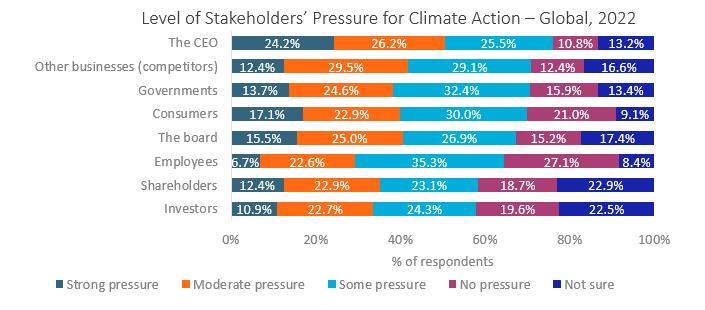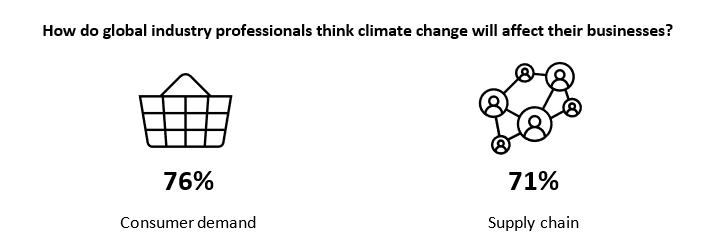November 2022 marks the 27th annual UN global climate summit. The theme for COP-27 focuses on the urgent need to move from negotiations and planning to implementation. Public-private collaboration is essential to achieve sustainable goals, so both governments and companies rapidly need to convert words into actions to make real changes. Here is Euromonitor International’s summary of the key content to help clients understand sustainability challenges and seize the opportunities.
The Rising Importance of Sustainability Strategies
There is a global consensus on the impact that climate change has on businesses, as reflected in the increasing number of global experts (82% in 2022 - a 2.2 percentage point increase on 2021) considering that climate action is very or extremely important for business, according to Euromonitor International’s Voice of the Industry: Sustainability Survey 2022.
Stricter legislation and increasing pressure by stakeholders to disclose environmental performance is forcing companies to consider the use of international standards to ensure transparency and accountability, especially around Environmental, Social and Governance (ESG) criteria.

Disruptive Opportunities Behind Net Zero Strategies
Acting on climate change mitigation is now essential for FMCG companies, but it needs to be executed in a transparent and accountable way. Setting net zero strategies is an effective strategy to demonstrate environmental commitment, but also to proactively tackle a still disruptive market space. This article takes a look at what a net zero strategy is, why it is important, and why companies should act now to uncover market potential with carbon neutral product claims.

Sustainability Aspirations Through Product Claims
Post-pandemic, there is again greater room to care about long-term global issues such as sustainable living and climate change. This article reviews how sustainable living aspirations through relevant claims are penetrating various FMCG industries.
E-commerce is witnessing search engine optimisation strategies increasingly buzzing with key words such as “sustainably sourced”, “net zero” or “carbon neutral”. However, to navigate their practical impact is close to impossible, not just for consumers, but is equally challenging for manufacturers when they try to move forward with different attempts to improve a product’s concept of specific value.
Webinar: How to Attract and Win Customers with Sustainable Products
Sustainability is in the spotlight. Yet, brands can struggle to effectively position products that support environmental or social causes. Why? Because decisions are often made without linking consumer, pricing and market dynamics. In this webinar, our experts turn thousands of data points into actionable next steps, so clients’ sustainable products stay competitive.
Podcast: Sustainable Food and Drinks: The Role of Regulators, Consumers and Businesses
It is difficult to find a company in any sector that has not yet deployed some kind of sustainability practice. However, while some companies undertake voluntary innovation ahead of legislation to improve their competitive advantage and mitigate unexpected risks, pressure from stakeholders, including consumers, is not enough to force companies to uphold their sustainability pledges, especially at a time of such unexpected economic shock following the pandemic. Therefore, it appears that most businesses are more likely to engage in sustainability-specific innovations only in response to increasingly stringent sustainability requirements or enforcements. Learn about the drivers of environmental sustainability regulations in food and drink industries and their implications for businesses and consumers.
For further insights into global sustainability strategies and challenges, visit Euromonitor International’s Sustainability Insights page, Environmental Sustainability: Country Performance and Product Claims and Climate Action in Travel and Tourism: Less Talk, More Action reports, or consider a bespoke consulting solution.
